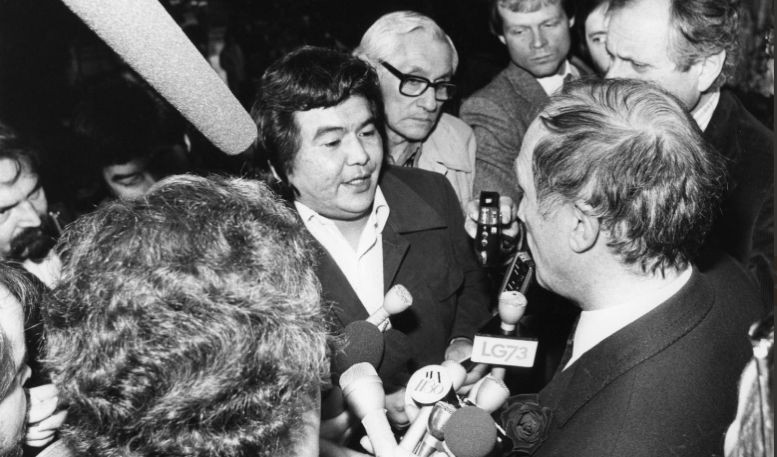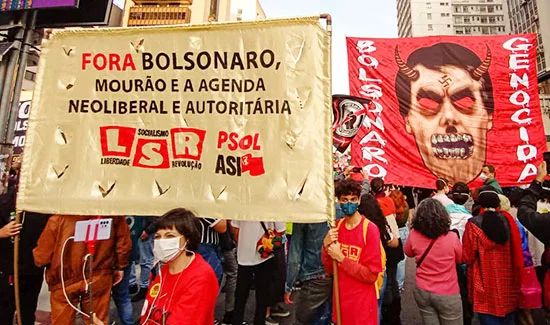“Economic reconciliation” is the latest buzzword being used by governments, central banks, chambers of commerce and political parties. The 2023 federal budget pledged $65 million toward “advancing economic reconciliation by unlocking the potential of First Nations lands.”
This strategy claims to bring economic prosperity to First Nations by encouraging them to participate and invest in resource extraction and exploitation. “Project Reconciliation” aims at 100 percent ownership of Trans Mountain Corporation (TMC) by 129 Indigenous nations. Other examples of “economic reconciliation” are in fisheries, mining and forestry.
However, the issue is not First Nations planning for and controlling the use of the land, air and water that they hold Aboriginal Title to. The issue is Canada — a colonial, capitalist state, keeping nations under their thumb by setting the terms of doing so within a capitalist framework that inevitably leads to further displacement and social disenfranchisement of Indigenous people and catapults us all towards climate catastrophe.
Capitalism is self-seeking and can be clever to move with the changing tide of public opinion. Why else would the Canadian state place such an emphasis on “reconciliation” and a newer trend of “economic reconciliation”? The Canadian Chamber of Commerce defines this as “the process of making economic amends for historical injustices to Indigenous Peoples.” An explicit acknowledgement of Canada’s unspeakable violence but it shies away from pointing to ongoing and longstanding injustices, including those that Canada’s Truth and Reconciliation Commission pointed to almost a decade ago and are still unaddressed.
Two Roads
George Manuel, a Secwépemc leader who led the National Indian Brotherhood, was active in the successful fight against the 1969 White Paper that proposed assimilation of Indigenous people in Canada. He said “we have only survived within a prison of deprivation, poverty and genocide. For too long now we have accepted freedom as a gift and that always produces berries with poison in it.” In 1980 he helped lead the Constitution Express, in which hundreds of Indigenous people travelled by train to Ottawa to pressure Prime Minister Trudeau to include Aboriginal rights in the Constitution. Manuel was defiant about this struggle, saying that habit has “compelled us to accept all policies and laws of the federal and provincial governments regardless of what misfortune, pain, sorrow and injustice they imposed upon our people… In our struggle to have our own Indian Government as a means to recover part of our aboriginal rights, we have only two roads that we can travel. The rules on one road are to adjust, to cooperate, to be silent, to submit, to obey, to betray, to compromise and the rewards are deprivation, poverty and genocide for the masses of our people and riches for a small number of native Indians. The rules of the other road are to fight, by any means and at any cost, to recover our pride, our dignity, and our aboriginal rights, to re-create and strengthen our Indian cultural, social, economic and political institutions” (B.C. Indian World, January 1981). The Constitutional Express was successful.
There is no blaming of any nation or group for participating in the fossil fuel industry or other forms of resource extraction. The decision is not made lightly considering the unimaginable responsibility of providing for communities that suffer the worst of capitalism’s greed and destruction. Capitalism’s raison d’etre is to create profits for owners and shareholders. Capitalism succeeds and thrives through divide and rule tactics, often pitting one group against another and sowing divisions within groups. Economic reconciliation is the latest attempt to turn Indigenous people into capitalists, with a few winners and many losers.
Reuben George is an example of many Indigenous leaders who reject succumbing to capitalism’s resource extraction agenda, at any cost to people or land. He is Sundance Chief and a member of the Tsleil-Waututh Nation. George manages the nation’s Sacred Trust initiative to protect the unceded Tsleil-Waututh lands and waters from the Trans Mountain Pipeline. In a recent CBC interview, he warned about the prospect of a spill from the pipeline and the dangers to their sacred territory. Acknowledging the pipeline is a reality, he said, “sometimes you can’t unscramble the egg, but you can unscramble the egg in the future.” He is looking, not to “economic reconciliation,” but to alternatives that don’t compromise the abundant gifts of land, water, fish, birds and people.




